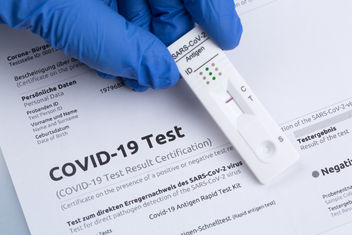What You Need to Know About COVID-19 Testing
February 1, 2022Getting tested for COVID-19 is as important as it is common these days. Knowing when and where to get tested is the first step in being prepared. We’ve put together a guide on what to know about COVID-19 testing.

The Inside Rx Blog
Get the Inside Scoop on tips & tricks that may help your family save on prescriptions!
Subscribe to stay up to date with the latest news and tips
When COVID-19 first hit the U.S., we all thought it would be “over” in just a few weeks. Yet, two years later, we are still learning how to best combat this virus. With ever-changing protocols, it is easy to get confused about what we should be doing to protect ourselves and others, how to get tested properly and what to do if we get COVID-19. To learn more about testing, read below.
When To Get Tested
There are two types of viral tests available to test if you currently have the COVID-19 virus.
PCR Test
RT-PCR, reverse transcription-polymerase chain reaction, tests can detect the presence of viral nucleic acid. These tests are less likely to result in a false-negative result and are often considered more reliable by healthcare providers. The results are typically processed by a laboratory and can take anywhere from an hour to more than a day to get results.
Rapid Antigen Test
Antigen tests detect the presence of a specific viral antigen, which implies current viral infection. These tests can be self-administered and produce quick results within 15-30 minutes of testing.
You should get tested, at home or a testing facility, if you begin experiencing COVID-19 symptoms. You should also get tested five days after being exposed to someone who is COVID-19 positive. If you plan to attend a large group function or if you are traveling, you should also get tested prior to such events.
Where To Get Tested
While the rapid at-home test is quick and convenient, some jobs, events, or places require a PCR test. If you need to get tested, there are a number of testing sites available in most locations. To find a testing site near you, visit your state or local health department website. We’ve linked a complete list of state and territorial health department websites here. You can also check with your pharmacy to see if they offer COVID-19 testing.
Free Rapid Tests
The federal government recently announced that free rapid testing kits that you can order for your home would be provided. Each household is able to order up to four free testing kits that will be delivered directly to your house. These tests are not PCR tests but are considered rapid antigen at-home tests. They provide quick results in about 30 minutes without going to a lab.
To order the tests, go to Covidtests.gov, follow the instructions and fill out a form with your information. It is possible that you could run into errors or complications if you live in an apartment building or other residencies that have the same address, such as multiple housing units. If you do run into problems ordering your free tests, you can call 1-800-232-0233 for help or more information.
Metoprolol Succinate
$ 8.23Allopurinol
$ 5.60Other Resources
You can also order at-home tests or purchase tests in-store if you are privately insured. Some private insurers offer reimbursements if you purchase up to eight tests per month. Contact your insurance provider for more information and to find out your options.
If you do get sick, Inside Rx is always here to help. Check out our blog for information on other topics. Stay healthy!

